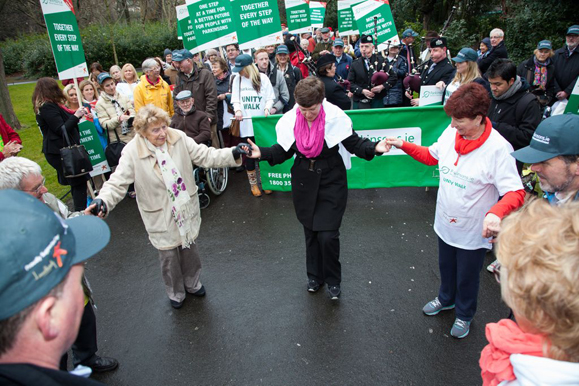Irish Set Dancing Found Therapeutic for Parkinson’s Patients
Italian neurologist Dr. Daniele Volpe has long been a fan of Irish traditional music, making yearly trips to Ireland and playing in a band under the stage name Dan Fox. Little did he think, however, that he would be able to incorporate his love of trad music with his work as head of the Parkinson’s Rehabili-tation Unit at St. John of God Hospital in Venice.
In June 2010, Volpe was playing alongside Charlie Piggot, one of the founding members of De Dannan, at the famed trad hot spot Peppers Pub in Feakle, Co. Clare. As the band was about to start, a man with an unsteady gait entered the pub and Dr. Volpe immediately recognized his symptoms as Parkinson’s disease. Parkinson’s, which affects an estimated 7 – 10 million people worldwide, the majority of whom are above the age of 50, is a degenerative disorder of the central nervous system. A progressive loss of dopamine-producing brain cells results in the impairment of motor skills, with symptoms including tremors, rigidity, slowness of movement, and poor balance and coordination.
When Dr. Volpe and the band opened the floor for a set dance, he was surprised to see the man with Parkinson’s set aside his walking aid and join the dancers. When the music started, he went through the moves effortlessly, and without any assistance. Amazed, Dr. Volpe asked Charlie Piggot about a particular leg movement he noticed, which Charlie identified as the reel step.
For many with Parkinson’s, posterior-anterior advancement of the lower limbs during the swing phase of the gait’s cycle is compromised. Yet, as Volpe observed, the reel step seemed to allow the Irishman to override this impediment.
As he thought about the reel step, Volpe noted a few key things about Irish set dancing: It is patterned, but steps are not overly repetitious. Execution of the pattern requires the dancer to change direction frequently. Directional change and the need to maintain reasonably consistent step lengths require the dancer to constantly transfer weight from one leg to the other.
But how? Volpe believes the answer may be the music. The strong upbeat rhythmic pattern of an Irish reel or jig may provide the brain with periodic acoustic cues that somehow enable it to bypass transmission disfunctionalities in the Basal Ganglia (BG) and in the SMA (Supplementary Motor Area) networks.
When Volpe returned to Venice, he conducted a small study to determine whether his observation was simply coincidence. He recruited a group of 24 subjects, all of whom presented moderate stage Parkinson’s symptoms (average Hoehn-Yahr score of 2.5).
The subjects were divided into two groups. Group 1, the control group, received conventional physiotherapy. Group 2 was introduced to Irish set dance courses. Testing after the six-month trial showed that while all forms of therapy were beneficial, the Irish set dance group showed much more significant improvement.
Dr. Volpe presented his initial findings in June 2012 to the International Congress of PD and Movement Disorders in Dublin. Following his presentation, a group of dancers from Venice, most of whom suffered from Parkinson’s, were asked to dance a figure from the Corofin Plain Set, before an audience of nearly one thousand.
Follow-up testing is now underway with an international randomized trial being conducted by researchers from the University of Limerick in Ireland and the University of Melbourne in Australia. Dr. Volpe is hopeful the initial success will be validated, and in time, Irish Set Dancing Therapy (ISDT) will become part of the conventional rehabilitation options available to patients everywhere.
Additionally, he wants to investigate the efficacy of ISDT in Alzheimer’s Disease and has begun development of a randomized control Trial process to better understand the therapeutic effects of ISDT on both diseases.
The village of Feakle will celebrate Dr. Volpe’s discoveries with two major events. As part of the 26th annual Traditional Music Festival on August 7, organizers have invited Dr. Volpe’s dance group of Parkinson’s patients to be special guest performers. On August 6, Volpe will present his latest findings at the first-ever Feakle Health Conference, devoted to the effects of Irish set dancing in the treatment of Parkinson’s disease.


Leave a Reply